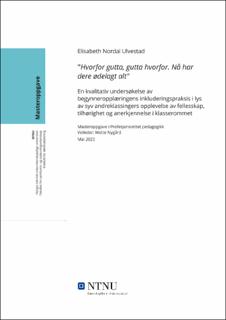| dc.contributor.advisor | Nygård, Mette | |
| dc.contributor.author | Ulvestad, Elisabeth Nordal | |
| dc.date.accessioned | 2022-09-07T17:22:56Z | |
| dc.date.available | 2022-09-07T17:22:56Z | |
| dc.date.issued | 2022 | |
| dc.identifier | no.ntnu:inspera:112400045:37183845 | |
| dc.identifier.uri | https://hdl.handle.net/11250/3016419 | |
| dc.description.abstract | Temaet for denne studien er elevers opplevelser og erfaringer av inkludering i begynneropplæringen, altså de første årene i skoleløpet. Studien sentrerer seg slik rundt hva som er sentralt av deres erfaringer, og hvilke aspekter ved inkludering som kan belyses i veien mot et mer helhetlig perspektiv. Formålet er å se betydningen av barns medvirkning i egen livsverden, og synliggjøre det som kan kalles “blinde flekker” i inkluderingsarbeidet, som her forstås som elementer ved inkludering som kan falle bort fra opplevelsen, dersom læreren ikke retter bevissthet mot dette.
Studien tar med dette utgangspunkt i følgende problemstilling: “Hva fremstår sentralt i opplevelsen av begynneropplæringens inkludering, sett fra et elevperspektiv?”. Problemstillingen besvares med bakgrunn i syv intervjuer av elever i begynneropplæringen. I lys av intervjuenes essens er tre kategorier for analyse og drøfting utformet; Om behov for å ha det bra, Om distinksjoner mellom kjønn, og Om skolens rammer, som videre trekkes frem og drøftes med relevant litteratur. Denne innebærer blant annet Bernsteins (2000) teori om klassifisering og innramming, Goffmans (1992) teori om hverdagens roller, samt Bussey og Banduras (1999) teori om det sosiale kjønn. Hver for seg og samlet er de trukket frem for dannelsen av en utvidet forståelse og sammenheng mellom informantenes perspektiver og studiens tematikk.
Studiens sentrale funn viser at opplevelsen av tilhørighet, anerkjennelse og fellesskap fra både medelever og lærer sentralt for inkludering, og at mangelen på dette kan ha innvirkninger i skolens inkluderingspraksis. I elevenes sosiale relasjoner kommer det frem at behov og forventninger er sentralt for opplevelsen av fellesskap i klassen, som videre viser seg å gå på tvers, i distinksjoner av hverandre med grunnlag i kjønnskategorier. Distinksjonenes opphav og påvirkning drøftes så med hensyn til inkluderingspraksisen. I studiens siste kategori diskuteres det hele i sammenheng, der elevenes beskrivelser av lærerens praksis blir sett i større sammenheng. Her kommer det frem at opplevelsen av lærerens praksis kan oppleves krenkende med en mangel på anerkjennelse, som igjen kan ha innvirkning i elevens evne til å anerkjenne hverandre. Statens innvirkning i skolens inkluderingspraksis drøftes her i kontekst, der kunnskapssamfunnet og tidlig innsats ses i sammenheng med lærerens mulighetsrom for å arbeide med inkludering. | |
| dc.description.abstract | The subject for this study is students' perception and experiences of inclusion in the initial education - the first years primary education. The study thus centers around what is central to their experiences, and which aspects of inclusion can be elucidated on the way towards a more holistic perspective. The purpose is to see the importance of children's participation in their own world of life, and perceive what can be called "blind spots" in the task of inclusion, which is here understood as elements of inclusion that can drop off from the experience, if the teacher does not aim consciousness against this.
The thesis is based on the following issue: "What is central to the perception of the inclusion of primary education, seen from a students perspective?". The issue is answered on the basis of seven interviews with students in primary education. In light of the essence of the interviews, three categories for analysis and discussion have been designed; About the need to feel good, About distinctions between genders, and About the school's framework, which are further highlighted and discussed with relevant literature. These include Bernstein's (2000) theory of classification and framing, Goffman's (1992) theory of everyday roles and Bussey and Bandura's (1999) theory of social gender. Separately and overall, the theories are highlighted the formation of an expanded understanding and connection between the informants' perspectives and the study's subject.
The central findings of the study show that the experience of belonging, recognition and unity from both fellow students and teachers is central to the schools inclusive practice, and that the absence of this can implicate the inclusive practice of the school. In the students' social relations, it emerges that needs and expectations are central to the experience of unity in the class, which further turns out to go across, in distinctions of each other based on gender categories. The origin and influence of the distinctions are then discussed with regard to the inclusion practice. In the last category of the study, this is discussed in context, where the students' descriptions of the teacher's practice are seen in a larger context. Here it emerges that the experience of the teacher's practice can be perceived as offensive with a lack of recognition, which in turn can have an impact on the student's ability to recognize each other. The state's impact on the school's inclusion practice is discussed in this context, where the knowledge society and early intervention are seen in connection with the teacher's scope for working with inclusion. | |
| dc.language | nob | |
| dc.publisher | NTNU | |
| dc.title | Hvorfor gutta, gutta hvorfor. Nå har dere ødelagt alt | |
| dc.type | Master thesis | |
